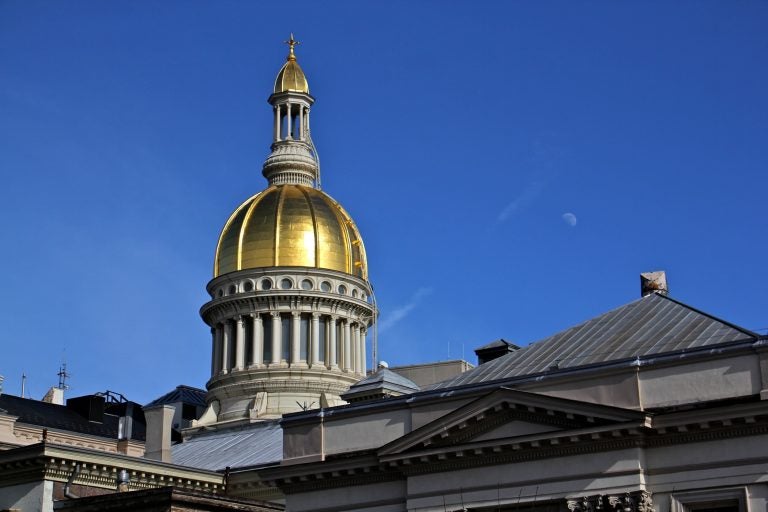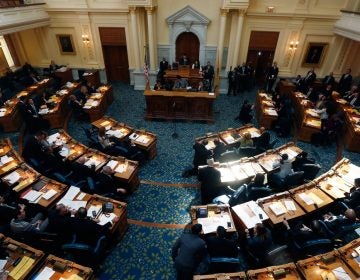Two proposals to relieve property tax burden moving through N.J. Legislature
Some New Jersey lawmakers are putting forward two proposals to address the state’s high property taxes. Here’s what those bills would do.

New Jersey Statehouse in Trenton. (Emma Lee/WHYY)
Some New Jersey lawmakers are putting forward two proposals to address the state’s high property taxes, after many of them promised to make affordability their top priority in the new legislative session.
The New Jersey Senate Community and Urban Affairs Committee recently approved legislation several lawmakers said will provide significant property tax relief across the state.
Senate President Nicholas Scutari (D-22) and Sen. Troy Singleton (D-7) introduced a bill they say would ensure more money from the Energy Tax Receipts Property Tax Relief Fund makes its way back to municipalities.
Revenue from the fund, which comes from state taxes on utility companies, is supposed to trickle back down to municipalities and help them avoid needing to raise property taxes. However, since 2008, about $14 billion has been diverted to the state’s general fund by both Republican and Democratic administrations to pay for other priorities.
As a result, some towns and cities have increased property taxes or cut back on public services, according to the New Jersey League of Municipalities.
Under this bill, the fund would have to send $331 million dollars to municipalities over the course of four years, beginning in fiscal year 2023.
Micah Rasmussen, a political analyst with the Rebovich Center for New Jersey Politics, said this bill could provide significant relief because municipalities would be required to use that money to lower property taxes, instead of increasing their budgets.
“There’s a lot of policy that’s aspirational,” Rasmussen said. “If these laws are enacted, what you see is what you get.”
However, similar efforts have failed in previous legislative sessions.
Assemblyman Jay Webber (R-26) in January sponsored an identical bill in the General Assembly.
“It just got bogged down in the Senate” during the last legislative session, Webber said.
“It really could make a difference to the local property tax burden across the state,” he said. “And, just as importantly, stand as … a precedent for the way in which we should be providing property tax relief …, ending the practice of just sending money around to lower levels of government and assuming that it provides property tax relief, when we all know it really just gets spent at a different level of government.”
Affordability, a perennial issue for New Jersey residents, has recently become a leading political buzzword. After a close gubernatorial election in November, and after Democrats lost several seats in the Legislature, including longtime Senate President Stephen Sweeney, elected officials said they heard the message that people want the government to focus on kitchen table issues like affordability.
Webber said this is a chance to make good on promises to make the state more affordable and expressed hope that the measure will be successful this time.
“I’m really happy to see that Sen. Singleton now is following through with the concept,” he said. “I’ll encourage my colleagues in the Assembly to do the same thing on our side and keep the momentum going.”
The Senate Community and Urban Affairs Committee also approved a bill that would increase the amount of money renters can deduct from taxable income. The measure would change the deduction for rent payments considered as property taxes from 18% to 30%.
Rasmussen said the average New Jersey renter who pays $1,500 per month ($18,000 annually) in rent would be able to deduct $2,100 more than they would under current law.
The deductible would increase from about $3,240 to $,5400 for the average renter, Rasmussen said.
At a public hearing on the bill last Thursday, Sheila Reynertson, a policy analyst at New Jersey Policy Perspective, advocated for the measure on behalf of the think tank and suggested amendments she said would benefit low-income workers.
Reynertson suggested that the deduction should be converted into a tax credit for renters making “less than a certain amount, taking into account household size.” Reynertson also suggested that the tax itself be refundable.
New Jersey Policy Perspective also asked for a fiscal note with data about which renters would benefit the most, and which renters miss out from the proposed tax break.
Both bills were referred to the Senate Budget and Appropriations Committee. The Assembly has yet to take action on its version of either bill during the current legislative session.
Gov. Phil Murphy has said his goal is to do what can be done on the state level to lower local property taxes, though it’s not clear whether he supports either of these measures.

Get daily updates from WHYY News!
WHYY is your source for fact-based, in-depth journalism and information. As a nonprofit organization, we rely on financial support from readers like you. Please give today.







